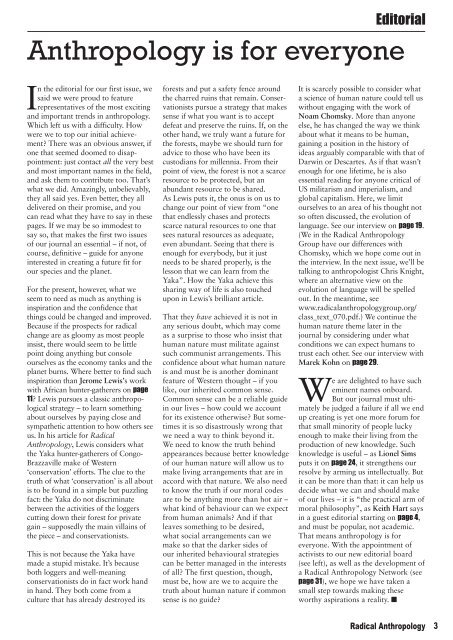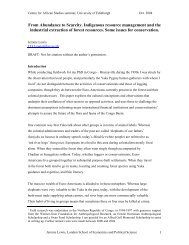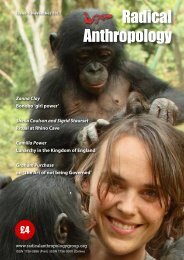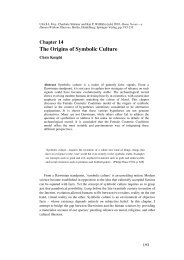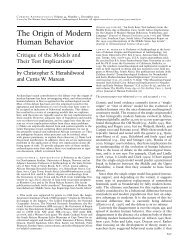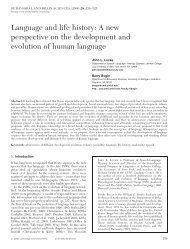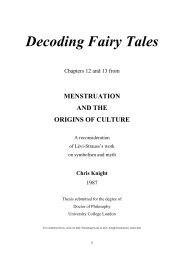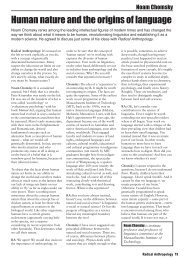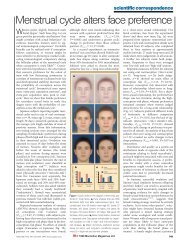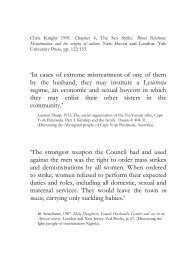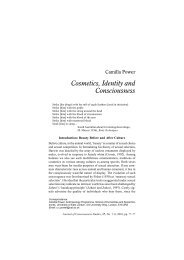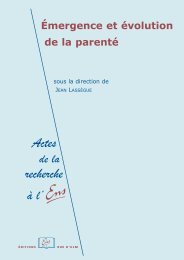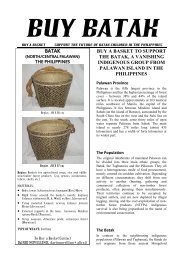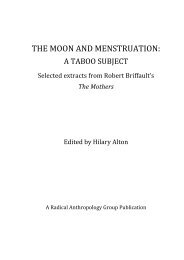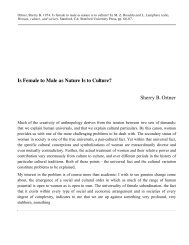The scarcity myth The scarcity myth - Radical Anthropology Group
The scarcity myth The scarcity myth - Radical Anthropology Group
The scarcity myth The scarcity myth - Radical Anthropology Group
You also want an ePaper? Increase the reach of your titles
YUMPU automatically turns print PDFs into web optimized ePapers that Google loves.
Editorial<br />
<strong>Anthropology</strong> is for everyone<br />
In the editorial for our first issue, we<br />
said we were proud to feature<br />
representatives of the most exciting<br />
and important trends in anthropology.<br />
Which left us with a difficulty. How<br />
were we to top our initial achievement<br />
<strong>The</strong>re was an obvious answer, if<br />
one that seemed doomed to disappointment:<br />
just contact all the very best<br />
and most important names in the field,<br />
and ask them to contribute too. That’s<br />
what we did. Amazingly, unbelievably,<br />
they all said yes. Even better, they all<br />
delivered on their promise, and you<br />
can read what they have to say in these<br />
pages. If we may be so immodest to<br />
say so, that makes the first two issues<br />
of our journal an essential – if not, of<br />
course, definitive – guide for anyone<br />
interested in creating a future fit for<br />
our species and the planet.<br />
For the present, however, what we<br />
seem to need as much as anything is<br />
inspiration and the confidence that<br />
things could be changed and improved.<br />
Because if the prospects for radical<br />
change are as gloomy as most people<br />
insist, there would seem to be little<br />
point doing anything but console<br />
ourselves as the economy tanks and the<br />
planet burns. Where better to find such<br />
inspiration than Jerome Lewis’s work<br />
with African hunter-gatherers on page<br />
11 Lewis pursues a classic anthropological<br />
strategy – to learn something<br />
about ourselves by paying close and<br />
sympathetic attention to how others see<br />
us. In his article for <strong>Radical</strong><br />
<strong>Anthropology</strong>, Lewis considers what<br />
the Yaka hunter-gatherers of Congo-<br />
Brazzaville make of Western<br />
‘conservation’ efforts. <strong>The</strong> clue to the<br />
truth of what ‘conservation’ is all about<br />
is to be found in a simple but puzzling<br />
fact: the Yaka do not discriminate<br />
between the activities of the loggers<br />
cutting down their forest for private<br />
gain – supposedly the main villains of<br />
the piece – and conservationists.<br />
This is not because the Yaka have<br />
made a stupid mistake. It’s because<br />
both loggers and well-meaning<br />
conservationists do in fact work hand<br />
in hand. <strong>The</strong>y both come from a<br />
culture that has already destroyed its<br />
forests and put a safety fence around<br />
the charred ruins that remain. Conservationists<br />
pursue a strategy that makes<br />
sense if what you want is to accept<br />
defeat and preserve the ruins. If, on the<br />
other hand, we truly want a future for<br />
the forests, maybe we should turn for<br />
advice to those who have been its<br />
custodians for millennia. From their<br />
point of view, the forest is not a scarce<br />
resource to be protected, but an<br />
abundant resource to be shared.<br />
As Lewis puts it, the onus is on us to<br />
change our point of view from “one<br />
that endlessly chases and protects<br />
scarce natural resources to one that<br />
sees natural resources as adequate,<br />
even abundant. Seeing that there is<br />
enough for everybody, but it just<br />
needs to be shared properly, is the<br />
lesson that we can learn from the<br />
Yaka”. How the Yaka achieve this<br />
sharing way of life is also touched<br />
upon in Lewis’s brilliant article.<br />
That they have achieved it is not in<br />
any serious doubt, which may come<br />
as a surprise to those who insist that<br />
human nature must militate against<br />
such communist arrangements. This<br />
confidence about what human nature<br />
is and must be is another dominant<br />
feature of Western thought – if you<br />
like, our inherited common sense.<br />
Common sense can be a reliable guide<br />
in our lives – how could we account<br />
for its existence otherwise But sometimes<br />
it is so disastrously wrong that<br />
we need a way to think beyond it.<br />
We need to know the truth behind<br />
appearances because better knowledge<br />
of our human nature will allow us to<br />
make living arrangements that are in<br />
accord with that nature. We also need<br />
to know the truth if our moral codes<br />
are to be anything more than hot air –<br />
what kind of behaviour can we expect<br />
from human animals And if that<br />
leaves something to be desired,<br />
what social arrangements can we<br />
make so that the darker sides of<br />
our inherited behavioural strategies<br />
can be better managed in the interests<br />
of all <strong>The</strong> first question, though,<br />
must be, how are we to acquire the<br />
truth about human nature if common<br />
sense is no guide<br />
It is scarcely possible to consider what<br />
a science of human nature could tell us<br />
without engaging with the work of<br />
Noam Chomsky. More than anyone<br />
else, he has changed the way we think<br />
about what it means to be human,<br />
gaining a position in the history of<br />
ideas arguably comparable with that of<br />
Darwin or Descartes. As if that wasn’t<br />
enough for one lifetime, he is also<br />
essential reading for anyone critical of<br />
US militarism and imperialism, and<br />
global capitalism. Here, we limit<br />
ourselves to an area of his thought not<br />
so often discussed, the evolution of<br />
language. See our interview on page 19.<br />
(We in the <strong>Radical</strong> <strong>Anthropology</strong><br />
<strong>Group</strong> have our differences with<br />
Chomsky, which we hope come out in<br />
the interview. In the next issue, we’ll be<br />
talking to anthropologist Chris Knight,<br />
where an alternative view on the<br />
evolution of language will be spelled<br />
out. In the meantime, see<br />
www.radicalanthropologygroup.org/<br />
class_text_070.pdf.) We continue the<br />
human nature theme later in the<br />
journal by considering under what<br />
conditions we can expect humans to<br />
trust each other. See our interview with<br />
Marek Kohn on page 29.<br />
We are delighted to have such<br />
eminent names onboard.<br />
But our journal must ultimately<br />
be judged a failure if all we end<br />
up creating is yet one more forum for<br />
that small minority of people lucky<br />
enough to make their living from the<br />
production of new knowledge. Such<br />
knowledge is useful – as Lionel Sims<br />
puts it on page 24, it strengthens our<br />
resolve by arming us intellectually. But<br />
it can be more than that: it can help us<br />
decide what we can and should make<br />
of our lives – it is “the practical arm of<br />
moral philosophy”, as Keith Hart says<br />
in a guest editorial starting on page 4,<br />
and must be popular, not academic.<br />
That means anthropology is for<br />
everyone. With the appointment of<br />
activists to our new editorial board<br />
(see left), as well as the development of<br />
a <strong>Radical</strong> <strong>Anthropology</strong> Network (see<br />
page 31), we hope we have taken a<br />
small step towards making these<br />
worthy aspirations a reality. ■<br />
<strong>Radical</strong> <strong>Anthropology</strong> 3


